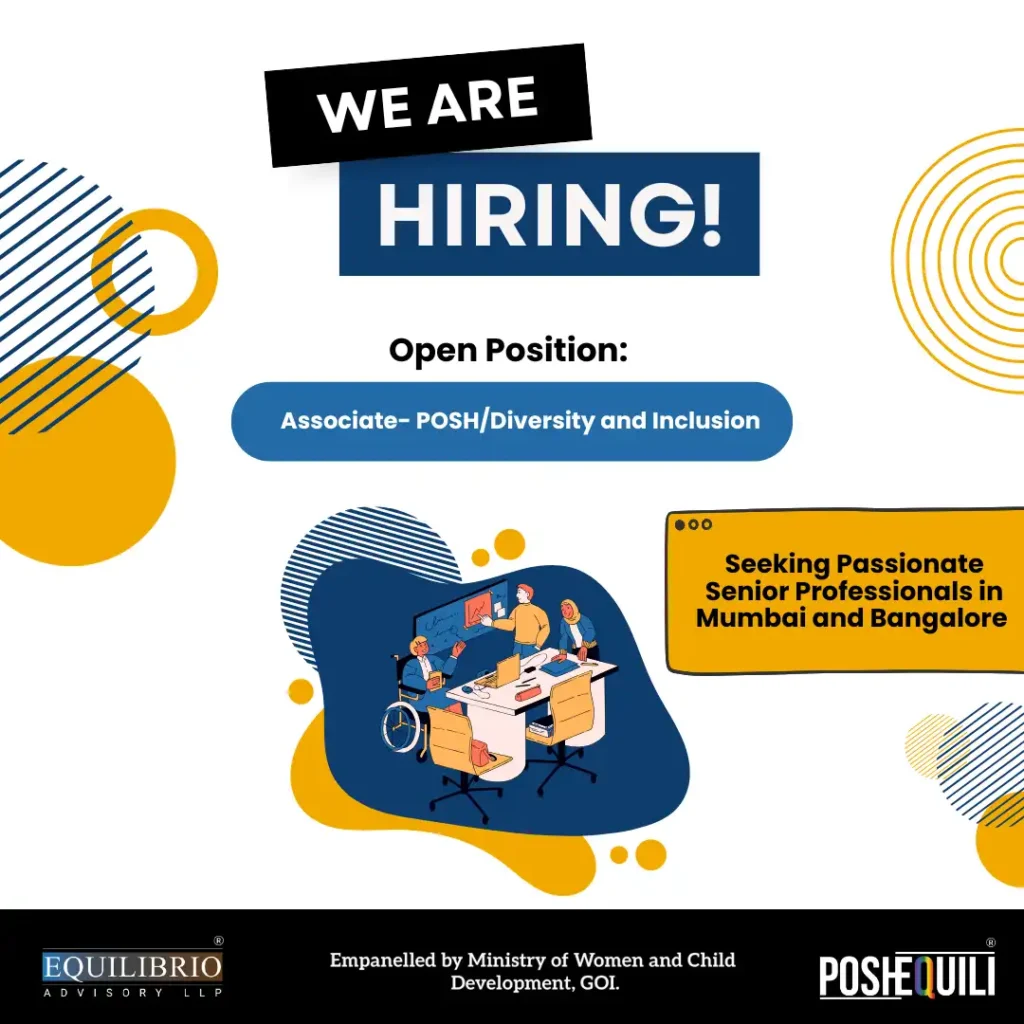This weekend we got a chance to interact with Ms. Sharmila Kher and seek her views (generally as someone who has been working for a decade for the rights of women and children and as an external member of the internal complaints committee of several organizations) on several facets of the law against sexual harassment at workplace. She was patient and kind enough to answer all our questions and share her experiences with us. Given below is what we discussed with her and this conversation was very insightful.
What, in your experience, has been the common understanding of sexual harassment?
I have often found that amongst a majority of people, the term sexual harassment, is misconstrued to mean “touching” or any kind of a physical contact such as rape or assault, thereby diluting the impact of other behaviours that add up to sexual harassment. I oft hear “I didn’t touch…only sent messages.” Therefore, clearly, many people do not understand the mental impact of the sexually coloured remarks they make towards a woman or offensive sexist jokes/images that they share with their female counterparts. It is extremely important, in my view, that through training/awareness sessions and otherwise, we drive home the point that a behaviour may be unwelcome to a woman and may constitute sexual harassment even if lewd remarks are made, pornographic material is shared etc.
On a scale of 1 to 10, how many women would you say prefer filing a complaint of sexual harassment vs. leaving the job?
My experience of these 2 years points to an increased propensity to file cases over resigning. I would give a rating of 8. However I would like to add that women often do contemplate resignation as an immediate response out of fear of repercussions.
I think the role of the corporate or the employer plays an important part here. If the woman feels supported by an active ICC and adequate advocacy and training and sensitisation has been done on the law related to prevention of Sexual Harassment at Workplace, then she will derive the courage to stand for her rights. The Law on its own may only act as a deterrent. The ultimate onus rests with the harassed person to be aware of her rights under the law and with the employer to be proactive in supporting the harassed. It is also critical that a conducive healthy safe work environment must rightfully be provided to every woman employee so she can deliver at her job to her full potential.
What are some of the biggest fears in a complainant’s mind when she is considering filing a complaint? Do they come to you for advice before filing?
The biggest fear is ostracisation and harassment by the prime accused and also by the other team members and subsequent loss of face. I am embarrassed to say that in many cases, when someone files a complaint, other team members, who may have experienced the same or similar situations at the same/other workplace, show bias and fail to support their colleague more often than not and instead of being neutral, carry the same pre-conceived notions of “she asked for it,” thereby leading to further harassment of the complainant. This “stereo-typing”, in my opinion, is something we need to work on if we really want a future where men and women treat each other equally and with respect and work together in harmony at a workplace.
The other fear is that of a slow down in their career growth. I oft hear them saying they feel like all their efforts will come to nought if they complain. My advise to them is simple – If you believe wrong has been done “stand up speak out”. A safe workplace and a workplace without discrimination is your constitutional right and you must protect that fearlessly for yourself and your other colleagues.
Do you receive many false complaints? How do you differentiate between false/malicious complaints and lack of evidence in a complaint?
I have been privy to complaints that lack evidence or do not fall under the ambit of the Act. This could be looked at as malicious intent in some cases. However most of this stems from improper understanding of the Act as also a tendency to bring all cases to the ICC irrespective of the nature of the case.
This points again for the need to reinforce workplace behaviours and professional code of conduct for employees. The personal and the professional has to be clearly defined to reduce the grey areas.
Have you ever experienced any kind of pressure from an organization to deal with a complaint in a particular way?
I have been privileged to work with large organisations that have shown tremendous investment in bettering work places and to create safe environments. In fact the seriousness and commitment that all these organisations have shown in cases of sexual harassment has injected in me a feeling of hope. I must add that all of us are on the learning curve and a cooperative collaborative approach will enable better outcomes. As an external ICC member from a women centric organisation I am vigilant to the pressures if any and do my best to be unbiased and fair in all the committees.
Do you receive complaints of sexual harassment from male employees? Is it very often? What is the nature of such complaints and how do you handle them?
I haven’t encountered a complaint from men but I have dealt with cases where the man has got embroiled for no obvious fault. In all our trainings we emphasise that though the Act is strictly for women we must remain cognisant to power play and possible harassment by women as well. Since the Act strictly allows only women employees to complain, my advise to men is you may approach the police for severe harassment.
In your opinion, on a scale of 1 to 10, how gender sensitive are the Indian workplaces? What would your advice be to bridge gender gaps?
The workplace would score 6. I think the Act is well intentioned to help make workplaces safe for women and it is the need of the hour given most workplaces in India and globally are still male dominated. The gaps are obvious and evident as the workplace reflects societal biases. Patriarchy is pervasive and there is a lot of stereotyping particularly of women. Women are still looked at with an air of an outsider trying to make inroads in a male dominated environment. This is creating an additional discord amongst the workforce.
I would add cautiously here….The Act isn’t intentioned to distance men from women but to sensitise and train men to act responsibly with women and to enable women the rightful space as equal employees. I would focus on sensitising men and working on their mindsets and to find ways and means to build an equitable workplace. We need to fix the mindset not create a paranoia about working together. This will certainly help bridge gaps.
Lastly, what are the things, in your opinion, external members should keep in mind when handling a complaint of sexual harassment?
I think external members must be well versed with the Act and be bias free. The external committee member plays a critical role in ensuring justice is done and she/he must at all times be a good listener. If she/he senses involvement of management in an ICC decision the external member is well within his/ her rights to make it clear that the ICC recommendations are to be followed in letter and spirit as the ICC has an independent quasi-judicial jurisdiction. Above all, the external member must dedicate time and attention to ensure every workplace they represent is free from all forms of sexual harassment and all cases are dealt with an iron hand to set examples for further dissuasion. This is a position of grave responsibility and must be treated with the gravitas it deserves.
Ms. Sharmila Kher has worked in a not for profit environment for almost 10 years and has constantly invested in the rights of women and children. Currently, she is the Head of fundraising at SNEHA, an NGO that works in partnership with communities and health systems to build effective and replicable solutions, empowering women and their families in urban slums to improve their health. She serves as an external member of the internal complaints committee of several organizations and believes that workplaces can be bettered and made more gender sensitive. She has been constantly inspired to work on this subject by her two sons, both of whom are in the legal field.
[The questions have been posed by Ms. Shivangi Prasad, the founder of POSHequili and an Advocate specializing in this subject. All the views expressed above constitute personal views and must not be construed as legal opinion at any point of time. The reference to the Law or the Act is reference to the Sexual Harassment of Women at Workplace (Prevention, Prohibition and Redressal) Act, 2013.]






